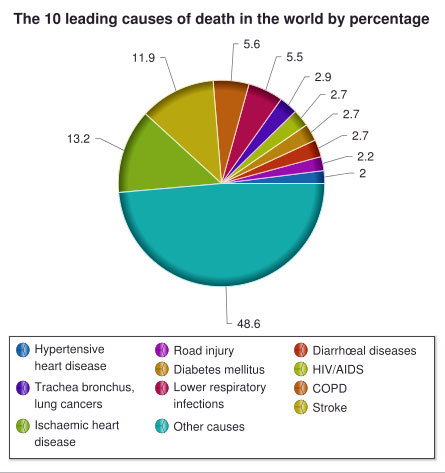
Stop Smoking to Prolong Your Life
En español
 Smoking damages every tissue and organ
in your body. You know it, we know it, and even children know it. But still,
people continue smoking. That is how addictive tobacco is.
Smoking damages every tissue and organ
in your body. You know it, we know it, and even children know it. But still,
people continue smoking. That is how addictive tobacco is.
Cigarette smoking is the most important preventable cause of
premature death in the United States. It accounts for more than 440,000 deaths
a year (20% of all deaths).
Smokers have a higher risk of
developing several chronic disorders; including atherosclerosis, 14 different
types of cancer and chronic obstructive pulmonary disease (emphysema).
 Globally, tobacco use kills over 6
million people a year, more than HIV, Tuberculosis, and malaria combined.
Globally, tobacco use kills over 6
million people a year, more than HIV, Tuberculosis, and malaria combined.
High
Blood Pressure is the only condition that kills more people around the world
every year at 9 million.
A buildup of fatty substances in the
arteries, known as atherosclerosis is the main contributor to the high number of
deaths from smoking. Many studies detail the evidence that cigarette smoking is
a major cause of coronary heart disease, which leads to heart attack.
Despite all of the feel-good reasons
why one may enjoy smoking, the fact remains that it damages your body. There is
a valid reason why a pack of cigarettes includes a warning label that says:
“Smoking kills”.
Nicotine alters the balance of
chemicals in your brain so that each time you inhale, it makes you feel
relaxed, less stressed and wanting more. So when you try to cut back, it makes
you anxious, causing headaches, lethargy, lightheadedness and a downright lousy
mood. Is it any wonder that so many people become addicted?
It’s time to listen to your heart
What does smoking actually do to your
body that puts you at risk for heart disease?
It may surprise you to learn that
smoking can double or even quadruple the risk of heart disease and stroke by
itself. When it acts with other factors, the risk is greatly increased. So, if
you have diabetes, high cholesterol or hypertension, smoking augments your risk
BIG TIME of developing heart disease. Smoking throughout your life shaves
13-14 years off your life expectancy.
Cigarette smoking is the most
important risk factor for young men and women. Women who smoke and use oral
contraceptives greatly increase their risk of coronary heart disease and stroke
compared with nonsmoking women who use oral contraceptive. Smoking may more
than double a woman’s risk of sudden cardiac death and quitting can reduce that
risk significantly over time.
Smoking not only increases the risk of
coronary heart disease and cancer, it also decreases exercise tolerance,
increases the tendency for blood to clot and the risk of recurrent coronary
heart disease after bypass surgery.
If that’s not enough there are approx.
4,000 chemical components found in cigarettes and at least 250 of them are
harmful to human health. That’s what’s going into your body every time you
inhale.
That’s what’s going into your body
every time you inhale.
How EXACTLY does smoking damage our
hearts?
- You are
essentially suffocating your heart, brain and arteries —stealing the
oxygen and pushing CO (carbon monoxide) through your body.
- It damages
your blood vessels making them susceptible to plaque build-up.
- It makes
your blood stick, which will promote blood clots.
- It
decreases your HDL (“good” cholesterol)
- For women
taking birth control pills, smoking increases your blood pressure and risk
for stroke and heart attack.
Chewing tobacco or whatever name you
want to call it – smokeless tobacco, pinch, dip or snuff tobacco is not safer
than cigarettes. Smokeless tobacco plays a role in the development of cancer
(mouth, gums, cheek, lips, tongue, throat, esophageal and pancreatic cancer),
heart disease, high blood pressure, stroke, cavities (tooth decay), gum disease
(causing tooth loss), and of course addiction.
The good news is that when you stop
tobacco, your risk for heart disease and stroke can be cut by 50% within one
year and continues to decline until it’s as low as a nonsmoker’s risk.
Your heart will thank you for quitting
tobacco, so don’t waste any time. The health benefits start almost immediately.
Until next time!

Stephanie Coulter, MD

